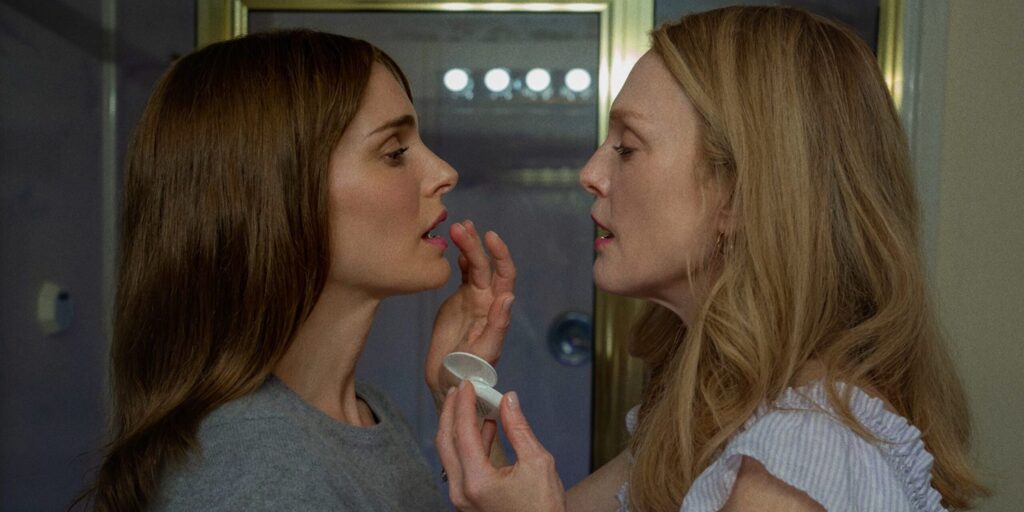May December – Snapshot
May December explores the rich relationship between three people, a husband and wife, raising children that are only 13 years younger than their Father, and an actress “doing research” for a movie about them. It will make you very uncomfortable as it twists and turns through profound moral questions. (4*)
Where to Watch:
Stream: Netflix
Rent: (Nowhere)
May December – The Oscar Buzz
Oscar Nominations (1) / Oscar Wins (0) :
Original Screenplay (Samy Burch / Alex Mechanik)
May December was nominated for its Original Screenplay written by Samy Burch and Alex Mechanik. Although they have worked before together on two short films, this is the first time either of them have done the script for a feature film. Burch has at least one additional short film under her belt and Mechanik has a longer history as a film editor, and both of them have worked TV episodes. So, with this background, it is highly unusual for them to score an Oscar nomination on their first feature film.
Part of the reason might lie with the choice of director, Todd Haynes. Although he has never been nominated for directing, he did receive an Original Screenplay nomination for Far From Heaven (02). But what makes Haynes such a great choice is that he seems to have a keen knack for directing women. He has worked with Julianne Moore on four films before this one including on her nominated performance in Far From Heaven. He directed Cate Blanchett to a nomination in I’m Not There (07). Perhaps most relevant, though, is that he helmed Carol (15), an earlier story about the relationship between two women that earned nominations for Cate Blanchett and Rooney Mara. His remarkable understanding of women shows in the developing relationship between Gracie and Elizabeth in this film.
Anyone who sees this movie has to be impressed with the acting of the three main characters. Natalie Portman plays the actress who is seeking to understand an older, morally complicated woman in order to portray “the truth” in an upcoming independent movie. Portman, who graduated from Harvard with a degree in psychology, won the Leading Actress nomination for her riveting performance in Black Swan, and secured nominations for Jackie (16), and Closer (04). (She has also had more popular roles in the Star Wars series as well as V for Vendetta). Portman has several scenes in May December that illustrate her careful and thoughtful understanding of her role and of her job as an actor. Pay particular attention to her explanation of how she does, or does not, manage to separate her intimate personal feelings from her acting when engaged in sex scenes – a fascinating explanation and important to understanding the film.
Julianne Moore, a generation older than Portman, plays Gracie Atherton-Yoo and is able to somehow convey the lack of remorse and regrets, based ultimately on extreme naïveté, with convincing realism. Moore won the Leading Actress Oscar for Still Alice and secured acting nominations for The Hours, The End of the Affair, Boogie Nights, and Far From Heaven. Moore delivers an icy-cool performance that distills the essence of a character that has managed to detach herself from conventional moral norms.
Her former student, and now husband, Joe Yoo, is played by young Charles Melton who is 31 years younger than Moore. Melton does not have any Oscar history and is, apparently, best known for his role in the TV series Riverdale. His performance is understated and controlled which is exactly the gravity the film needs to center the two women who are orbiting, with apparent lack of control, around him.
The rest of the crew for this film does not seem to have as much Oscar experience as Haynes, Moore, or Portman. Haynes brought his editor, Alfonso Goncalves, from Carol to work on May December and the editing seems tight and crisp. There are a couple of scenes that don’t seem to contribute a whole lot (Joe’s conversation with his father, for example), but they don’t last a long time and the film doesn’t ever seem to drag, especially when two of the three main characters are together. Set on one of Georgia’s coastal islands, Tybee Island, cinematographer Christopher Blauvelt bathes everything in an almost foggy haze that simulates summer heat and beckons steamy sweat.
One last note about the music. Some reviewers found the music a bit oppressive and I can appreciate that sentiment, although I also think it contributes to the uncomfortable feeling you get watching this film.. Marcelo Zarvos is the composer for May December and, apparently, he borrowed some of the major themes from Michel Legrand’s score from The Go Between (71) which I have not seen but apparently also involves a similar May December romance.
May December – Related Movies
Carol (15) (Direction, Film Editing)
Black Swan/Jackie (Portman)
Far From Heaven/Boogie Nights/Still Alice/The Hours/The End of the Affair (Moore)
Velvet Underground (21) (Direction, Film Editing)
Emma (20) (Cinematography)
The Lost Daughter (21) (Film Editing)
Wonder/Flamin’ Hot/Breakthrough/The Go Between (Musical Score)
Judas and the Black Messiah (21) (Production Design)
Lady Bird (17) (Costumes)
Oppenheimer (23)/Once Upon a Time…in Hollywood/Babylon/Licorize Pizza/Avengers (Makeup)
May December – What Others Think
May December has the largest difference in ratings – where the critics liked it and the viewing public did not – of all 38 of this year’s Oscar-nominated movies. Although the film only cost about $20 million to make, it only did around $5 million at the box office, showing definite lack of audience appeal. Some reviewer comments include “Boring and Slow”; “The music dominates too much”, and “Focused on the wrong characters.” Overall audiences rated only three of this year’s films to be worse than May December. Since the Oscar nomination, viewer appreciation has increased some, but is still not great.
Critics were much more positive about the movie and, overall, ranked it 9th out of the 24 general interest movies (tied with the Mission Impossible film) and 14th out of all 38 of this year’s films. Critics tend to not care a whole lot about the box office appeal of a movie and I suspect their enthusiasm carried over into the unusual Oscar nomination.
Despite the lack of an acting nomination, critics had a lot to say about the performances. Ben Kenigsberg (RogerEbert) said that “Moore is nervous perfection in her role”. Monica Castillo (RogerEbert) wrote of May December “It’s a marvelous showcase of Moore, Portman, and Haynes’ mastery of their crafts.” Sheila O’Malley (RogerEbert) wrote “Portman’s reading of the line “This is what grown-ups do” was such a gut punch I never recovered my equilibrium.”
It wasn’t just the acting, though. Manohla Dargis (New York Times) gave the film a Critics Pick and wrote that Haynes “uses beautiful images, bursts of lush music, pointed metaphors and floods of feeling to provide the familiar pleasures of a well-told absorbing narrative film, even as he picks it apart at the seams. This can create an uneasy dissonance…”. I believe that it is exactly this “dissonance” that creates such discomfort for viewers and I will have more to say about that in the final section.
Because there was such a difference between the critics and the viewing public about May December, taking an average rating is a little bit deceptive. The film ends up falling below the mid-point, 15th out of 24 general interest movies (and 28th out of all 38 Oscar-nominated films.). I think it is a better movie than that.
May December – Special Mention
Mary Kay Letourneau and Hebephilia – Hebephilia is a documented mental disorder where an adult has a sexual interest in a child in early adolescence (11-14). It is distinguished from pedophilia which involves younger children. I found three documented cases of adult female sexual interest in males of that age. Debra Lafave had a sexual encounter with a 14-year old in 2004 and Pamela Joan Rogers was convicted of sexual battery with a 13-year old a year later.
But the case that caught national tabloid, criminal, and psychological interest was that of Mary Kay Letourneau, a 34 year old junior high teacher who had sex with a 12 year-old student, Vili Fualaau, not once, but multiple times, resulting in two children and a seven year prison sentence. Convicted in 1997, she gave birth to their first child while awaiting sentencing and was given a suspended sentence. Then she had sex with Fualaau again, her suspended sentence was revoked and she served a seven year prison term where she gave birth to Fualaau’s second daughter. When she got out of prison in 2005, she and Fualaau married and that relationship survived fourteen years until they separated in 2019. If you do the math, that means that Fualaau’s oldest daughter was only 13 years younger than he was!
Psychologists struggle to understand Letourneau. Her father was a strict conservative, even a member of the John Birch Society, and he ran for president in 1972. Even so, he ended up fathering two children out of wedlock, having an affair with one of his college students. Letourneau was married before Fualaau and had four children with her first husband. That marriage, though, was apparently abusive, without romance, and facing financial problems. Her first husband divorced her in 1999, while she was in prison. But the remaining question is how does all that result in an attraction to a child just entering puberty? May December is loosely based on this story and dances around many of these issues.
May December – Michael’s Moments
May December is designed to make you feel uncomfortable. And why shouldn’t you? While female interest in younger men is a known and acceptable behavior, interest in a twelve year-old not only stretches, but breaks the norms of even the most sexually-liberated adult. But, thankfully, the film doesn’t really explore what happened to trigger the beginnings of this unique relationship. Instead it tries to probe what these people’s minds and lives must be like some 18 years later, when Gracie (the Letourneau figure) is in her late 50s and her husband, Joe, is now in his mid 30s, and they are raising the children he fathered as a pre-teen. And there is where the discomfort explodes – how can you possibly father someone when you are barely 13 years older than they are? The discomfort builds in scene after scene including one critical scene where Joe is smoking pot with his son on the rooftop.
The vehicle for this insight into the couple comes by sending an actress, Elizabeth (Portman) into the mix. Elizabeth is going to play Gracie in a movie that tries to tell the strange, and twisted, story of this couple. We watch as Elizabeth studies Gracie’s every movement. We see the two of them in an almost erotic moment when Gracie is showing Elizabeth how she puts on makeup. And we see Elizabeth learning to mimic Gracie’s mannerisms, lisp, even the way she folds her arms as she sits (pay attention to the mirror scene in the dress store which elegantly frames Elizabeth between two images of Gracie).
But this isn’t just a case of an actress doing research for her role. Elizabeth has issues of her own. We see this clearly when she is alone in the pet store stockroom where the original deed was done nearly two decades earlier. And, in one of the best scenes of the movie, we see Elizabeth explain her approach to having sex in movies to a high-school drama class where she demonstrates a very clear understanding of just how delicate and subtle the line between reality and fiction can be.
Haynes manages to develop the imploding relationship between Gracie and Elizabeth and its cascading effects on Joe in multiple, creative ways. The music, much of it borrowed from another movie, creates a taut atmosphere suggesting ominous developments just around the corner. The hazy camera work suggests not just a hot Georgian summer, but sweaty sex, and the metaphor with the Monarch butterflies is so suggestive, and who, exactly, does it apply to – who is emerging from the cocoon? The mystery twists and turns as these three people dance around each other.
May December is not the movie you might think it is. It is designed to make you feel uncomfortable because, well, the basic moral premise behind the entire scenario is grossly uncomfortable. I think it is exactly that that turns audiences off from this film. But if you can hold your judgment you will allow entry into a twisted world where sex and psyches all become jumbled up. And you leave the movie questioning Elizabeth’s dramatic assertion “It’s what grown-ups do!”
You should not feel comfortable with May December. But you should see it anyway. (4*)



